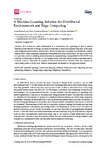A Machine Learning Solution for Distributed Environments and Edge Computing

Use this link to cite
http://hdl.handle.net/2183/23921
Except where otherwise noted, this item's license is described as Atribución 4.0 Internacional (CC BY 4.0)
Collections
- Investigación (FIC) [1678]
Metadata
Show full item recordTitle
A Machine Learning Solution for Distributed Environments and Edge ComputingDate
2019-08-09Citation
Penas-Noce, J.; Fontenla-Romero, Ó.; Guijarro-Berdiñas, B. A Machine Learning Solution for Distributed Environments and Edge Computing. Proceedings 2019, 21, 47. https://doi.org/10.3390/proceedings2019021047
Abstract
[Abstract] In a society in which information is a cornerstone the exploding of data is crucial. Thinking of the Internet of Things, we need systems able to learn from massive data and, at the same time, being inexpensive and of reduced size. Moreover, they should operate in a distributed manner making use of edge computing capabilities while preserving local data privacy. The aim of this work is to provide a solution offering all these features by implementing the algorithm LANN-DSVD over a cluster of Raspberry Pi devices. In this system, every node first learns locally a one-layer neural network. Later on, they share the weights of these local networks to combine them into a global net that is finally used at every node. Results demonstrate the benefits of the proposed system.
Keywords
Machine learning
Distributed learning
Artificial neural networks
Big Data
Privacy-preserving
Internet of things
Edge computing
Raspberry
TensorFlow
Distributed learning
Artificial neural networks
Big Data
Privacy-preserving
Internet of things
Edge computing
Raspberry
TensorFlow
Editor version
Rights
Atribución 4.0 Internacional (CC BY 4.0)
ISSN
2504-3900






